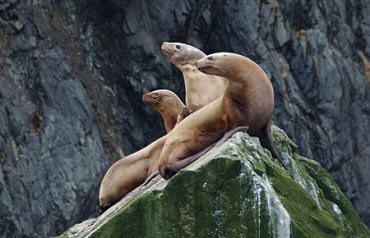Court upholds fishing restrictions for Alaska sea lions

(Alaska Department of Fish and Game / Alaska Dispatch)
The U.S. 9th Circuit Court of Appeals on Tuesday upheld a lower court’s ruling that keeps in place fishing closures and restrictions in the Western Aleutian Islands meant to protect and rebuild declining populations of Steller sea lions in Western Alaska.
In 2011 the National Marine Fisheries Service was sued by the state of Alaska and 23 fishing-related coalitions — most based in Washington state — over restrictions to for pollock, cod and mackerel fisheries that were put in place by the federal agency to protect the area’s Steller sea lion populations, thought to be in decline.
Tuesday’s ruling upholds the closures and restrictions, saying they were properly put in place and that an environmental impact statement, being done by the agency after a 2010 court order, was not necessary to keep the protections from being overturned. The court further ruled that the agency did not err in its conclusion that overfishing of Western Steller sea lion prey species — cod, mackerel, and pollock — was partially to blame for their decline.
The Western Aleutian Steller sea lion was placed on the endangered species list in 1997. They range from the Bering Sea to the mid-Aleutian Islands near Dutch Harbor, 1,000 miles southwest of Anchorage. All pollock fishing was closed in the Western Aleutians in 1998. Further closures and restrictions — impetus for the latest lawsuit — were put into place in 2010.
Eastern Steller sea lions were declared a separate stock in 1997 and were listed as threatened. They range from Southeast Alaska to California, and their numbers have been rebounding.
“We have litigated this five times since 1998, and with the 9th Circuit’s ruling today, we hope we can move past the legal arguments and start working to rebuild the Sea Lion populations in the Western Aleutians,” said Jon Warrenchuck, Campaign Director and Senior Scientist for Oceana, one of the environmental groups that filed briefs opposing the lawsuit.
Leaders of several fishing groups involved in the suit said they would withhold comment until they’d read the court’s decision.
The restrictions at issue were put in place in 2010, and prohibit all fishing for pollock, Atka mackerel, and Pacific cod in the far western Aleutians. Further restrictions including closures surrounding local rookeries and haul-out sites were imposed and stretch all the way to the mid-Aleutians and Dutch Harbor.
NMFS proposed the measures to protect areas in the Aleutians where Steller sea lion populations are thought to have plummeted as much as 80 percent. Steller sea lions are among the largest pinnipeds, with only walruses and elephant seals growing larger. Overall, since the 1960s — when there were an estimated 140,000 of the animals in the Western Aleutian Islands — the population as a whole had dropped by about 70 percent.
But the state contends the total population of Steller sea lions in the western area is actually increasing. In its pleading to the court, the state argued that since 2000, the overall population of animals there grew annually by an average of 1.4 percent. The Department of Law argued that NMFS was using outdated data from the 1980s and 1990s to show a decline of 5 percent per year. According to figures cited by the state, there are now as many as 75,000 Steller sea lions in the western area, with as many as 45,000 of those residing in Alaska waters.
The state estimated in court filings that the closures could cost as much as $83 million per year in lost revenue and as many as 750 lost fishing-related jobs.
Tuesday’s ruling may not be the end of the issue.
the state of Alaska, or any of the other 23 plaintiffs could ask the entire 9th Circuit Court to hear the case. It could also petition the U.S. Supreme Court to overrule the 9th Circuit’s ruling.
Contact Sean Doogan at sean(at)alaskadispatch.com



